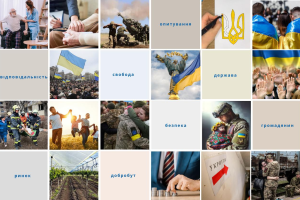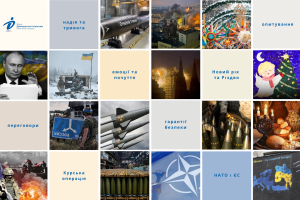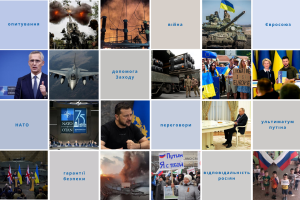The shift towards the European traditions of commemorating the end of World War II has formally begun after the Revolution of Dignity. On 8 May 2014, the Cabinet of Ministers of Ukraine supported the initiative of the Ukrainian Institute of National Remembrance to introduce the red poppy as a new symbol of remembrance and to launch the commemorations on 8 May. In 2015, as part of the decommunisation process, the Verkhovna Rada of Ukraine passed a law, and President Petro Poroshenko signed a decree "On the events in 2015 to mark the 70th anniversary of the Victory over Nazism in Europe and the 70th anniversary of the end of World War II". This introduced the simultaneous commemoration of the Day of Remembrance and Reconciliation on 8 May and the Day of Victory over Nazism on 9 May.
This initiative fostered an ongoing public debate about the role of Ukrainians during the World War II, historical memory and historical consciousness as important factors in the nation building. In fact, it has become an important tool for distancing Ukrainians from Russian myths about the war and the cult of "victory" that the Russian regime has intensively cultivated for decades, promoting its own twisted interpretation of those events.
However, this innovation was not immediately widely supported in Ukrainian society. Soviet traditions and modern Russian media narratives have long divided society into supporters and opponents of reinterpreting the events and consequences of the World War II. According to a monitoring study by the Institute of Sociology of the National Academy of Sciences of Ukraine conducted in June-July 2015, only one third (34.3%) of citizens supported the simultaneous celebration of the memorable dates of 8 and 9 May. While a quarter of respondents (24.7%) believed that Victory Day should be celebrated only on 9 May. In addition, 13.3% of respondents believed that these events should be marked on the same day - 9 May. In contrast, the share of those who favoured commemorating the events of the end of World War II only on 8 May did not exceed 10% of respondents.
| 2015 |
I support the marking of 9 May and 8 May alongside | 34,3 |
I believe that it is necessary to keep only the Victory Day celebrations on 9 May | 24,7 |
I believe that only the Day of Remembrance and Reconciliation on 8 May should be marked | 6,5 |
I believe that these events should be marked on the same day on 9 May | 13,3 |
I believe that these events should be marked on the same day on 8 May | 3,3 |
Hard to tell | 5,6 |
I don't care | 12,3 |
Source: monitoring study conducted by the Institute of Sociology of the National Academy of Sciences of Ukraine, in 2015
A survey conducted by the Ilko Kucheriv Democratic Initiatives Foundation in cooperation with the Razumkov Centre sociological service in April 2021 indicates a gradual acceptance of the idea of marking both dates. There has been a slight increase in public support for the simultaneous commemoration of the 8 and 9 May (up to 41%). However, a considerable share (30.9%) continued to insist on celebrating only the Day of Victory over Nazism on 9 May. Notably, support for marking only the Day of Remembrance and Reconciliation on 8 May has remained unchanged for six years.
| 2021 р. |
Both the Day of Remembrance and Reconciliation on 8 May and the Day of Victory over Nazism on 9 May | 41,0 |
Only the Day of Victory over Nazism on 9 May | 30,9 |
Only the Day of Remembrance and Reconciliation on 8 May | 9,4 |
I don't care | 9,5 |
Hard to tell | 9,2 |
Source: poll by the Ilko Kucheriv Democratic Initiatives Foundation and the Razumkov Centre sociological service in 2021.
This ambiguity in the perception of these two dates was due to the fact that there was a "competition" between the worldwide concept of the "World War II" and the concept of the "Great Patriotic War", common to the postsoviet societies.
In 2015, only one-fifth of Ukrainians were positive about the idea of denying the 1941-1945 war as the Great Patriotic War for Ukraine, while 62.1% of respondents were negative about it.
| 2015 |
Very positive | 10,9 |
Somewhat positive | 9,0 |
Somewhat negative | 22,1 |
Very negative | 40,0 |
Hard to tell | 18,0 |
Source: monitoring study conducted by the Institute of Sociology of the National Academy of Sciences of Ukraine, in 2015
However, in the aforementioned 2021 poll by the Ilko Kucheriv Democratic Initiatives Foundation and the Razumkov Centre sociological service, the concept of the Great Patriotic War as a victory of the Soviet people alone received much less support (37.3%). Still, the definition of Victory Day as the victory of the Anti-Hitler Coalition in World War II was supported even less (by a quarter of respondents).
| 2021 |
Victory Day is first and foremost a marking of the victory of the Anti-Hitler Coalition in World War II | 24,9 |
Victory Day is first and foremost a marking of the victory of the Soviet people in the Great Patriotic War | 37,3 |
None of the options proposed | 25,2 |
Hard to tell | 12,7 |
Source: poll by the Ilko Kucheriv Democratic Initiatives Foundation and the Razumkov Centre sociological service in 2021.
Notable is the trend on the percieved content of 9 May revealed by the Rating sociological group. Unfortunately, this methodology did not include a choice between the two dates. However, a dramatic change in attitudes caused by the Russo-Ukrainian war is observed. In particular, while before 2014, the perception of 9 May as Victory Day dominated, in 2018, a third of Ukrainians perceived this date as the Day of commemoration of the World War II victims. And after the full-scale Russian invasion, the vast majority of Ukrainians began to view 9 May as the Day of commemoration of the World War II victims.
| April 2012 | April 2014 | April 2018 | April 2022 |
Victory Day | 74 | 73 | 58 | 15 |
Day of commemoration of the World War II victims | 18 | 24 | 34 | 80 |
Hard to tell | 8 | 3 | 8 | 5 |
Source: Rating Group
However, if we compare Victory Day to other holidays in terms of importance for Ukrainians, according to KIIS polls, back in 2010 Victory Day was one of the most important/favorite holidays, being only behind Christmas, New Year's Day and Easter in terms of popularity (58%). However, over time, this historic date began to be outranked by many religious and secular holidays. And with the outbreak of the full-scale Russian-Ukrainian war, only one in ten respondents noted the importance of this date. Instead, the current dramatic events have led to an increase in the number of those who value the Defender of Ukraine Day and Independence Day.
Holidays | 2010 | 2013 | 2016 | 2017 | 2018 | 2020 | 2021 | 2023 | 2024 |
New Year's Eve | 81 | 81 | 74 | 76 | 79 | 74 | 55 | 52 | 47 |
Christmas Day | 79 | 79 | 79 | 80 | 81 | 79 | 63 | 69 | 70 |
International Women's Day | 49 | 49 | 37 | 49 | 45 | 40 | 34 | 25 | 21 |
Labour Day | 12 | 10 | 7 | 12 | 9 | 11 | 12 | 5 | 4 |
Easter | 84 | 83 | 81 | 80 | 82 | 77 | 72 | 70 | 68 |
Victory Day | 58 | 40 | 35 | 37 | 31 | 33 | 30 | 13 | 11 |
Trinity Day | 29 | 36 | 34 | 29 | 35 | 31 | 17 | 22 | 17 |
Constitution Day of Ukraine | 6 | 4 | 5 | 5 | 5 | 7 | 14 | 29 | 28 |
Independence Day of Ukraine | 17 | 12 | 20 | 17 | 16 | 19 | 37 | 63 | 64 |
Defender of Ukraine Day | – | – | – | 10 | 11 | 13 | 29 | 54 | 58 |
Source: Kyiv International Institute for Sociology
Thus, Victory Day, which was celebrated on 9 May, is no longer a sacred day for Ukrainians, given that this date is very actively celebrated in Russia with a militaristic aggressive attitude. Due to Russian aggression, many Ukrainians have consciously distanced themselves from this date, increasingly supporting the tradition of commemorating soldiers who fell in World War II on the pan-European day of 8 May. In addition, the modern war of liberation is more relevant to the nation, so the percieved importance of the events of World War II naturally fades.
So, in 2023, Ukraine officially switched to a single date – 8 May – as the Day of Remembrance and Victory over Nazism in World War II.








